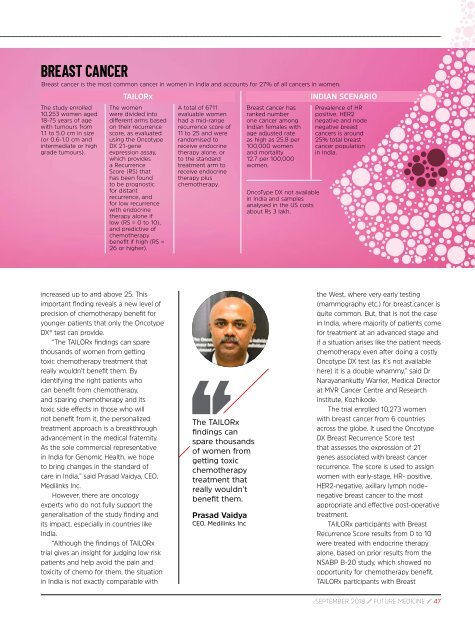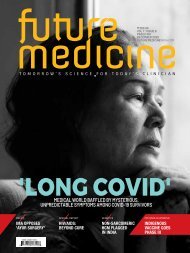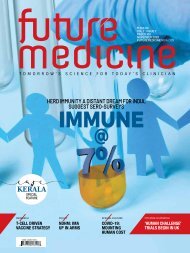FM SEPTEMBER 2018 ISSUE - digital edition
Create successful ePaper yourself
Turn your PDF publications into a flip-book with our unique Google optimized e-Paper software.
BREAST CANCER<br />
Breast cancer is the most common cancer in women in India and accounts for 27% of all cancers in women.<br />
The study enrolled<br />
10,253 women aged<br />
18-75 years of age<br />
with tumours from<br />
1.1 to 5.0 cm in size<br />
(or 0.6-1.0 cm and<br />
intermediate or high<br />
grade tumours).<br />
TAILORx<br />
The women<br />
were divided into<br />
different arms based<br />
on their recurrence<br />
score, as evaluated<br />
using the Oncotype<br />
DX 21-gene<br />
expression assay,<br />
which provides<br />
a Recurrence<br />
Score (RS) that<br />
has been found<br />
to be prognostic<br />
for distant<br />
recurrence, and<br />
for low recurrence<br />
with endocrine<br />
therapy alone if<br />
low (RS = 0 to 10),<br />
and predictive of<br />
chemotherapy<br />
benefit if high (RS =<br />
26 or higher).<br />
A total of 6711<br />
evaluable women<br />
had a mid-range<br />
recurrence score of<br />
11 to 25 and were<br />
randomised to<br />
receive endocrine<br />
therapy alone, or<br />
to the standard<br />
treatment arm to<br />
receive endocrine<br />
therapy plus<br />
chemotherapy.<br />
Breast cancer has<br />
ranked number<br />
one cancer among<br />
Indian females with<br />
age adjusted rate<br />
as high as 25.8 per<br />
100,000 women<br />
and mortality<br />
12.7 per 100,000<br />
women.<br />
OncoType DX not available<br />
in India and samples<br />
analysed in the US costs<br />
about Rs 3 lakh.<br />
INDIAN SCENARIO<br />
Prevalence of HR<br />
positive, HER2<br />
negative and node<br />
negative breast<br />
cancers is around<br />
25% total breast<br />
cancer population<br />
in India.<br />
increased up to and above 25. This<br />
important finding reveals a new level of<br />
precision of chemotherapy benefit for<br />
younger patients that only the Oncotype<br />
DX® test can provide.<br />
“The TAILORx findings can spare<br />
thousands of women from getting<br />
toxic chemotherapy treatment that<br />
really wouldn’t benefit them. By<br />
identifying the right patients who<br />
can benefit from chemotherapy,<br />
and sparing chemotherapy and its<br />
toxic side effects in those who will<br />
not benefit from it, the personalized<br />
treatment approach is a breakthrough<br />
advancement in the medical fraternity.<br />
As the sole commercial representative<br />
in India for Genomic Health, we hope<br />
to bring changes in the standard of<br />
care in India,” said Prasad Vaidya, CEO,<br />
Medilinks Inc.<br />
However, there are oncology<br />
experts who do not fully support the<br />
generalisation of the study finding and<br />
its impact, especially in countries like<br />
India.<br />
“Although the findings of TAILORx<br />
trial gives an insight for judging low risk<br />
patients and help avoid the pain and<br />
toxicity of chemo for them, the situation<br />
in India is not exactly comparable with<br />
The TAILORx<br />
findings can<br />
spare thousands<br />
of women from<br />
getting toxic<br />
chemotherapy<br />
treatment that<br />
really wouldn’t<br />
benefit them.<br />
Prasad Vaidya<br />
CEO, Medilinks Inc<br />
the West, where very early testing<br />
(mammography etc.) for breast.cancer is<br />
quite common. But, that is not the case<br />
in India, where majority of patients come<br />
for treatment at an advanced stage and<br />
if a situation arises like the patient needs<br />
chemotherapy even after doing a costly<br />
Oncotype DX test (as it’s not available<br />
here) it is a double whammy,” said Dr<br />
Narayanankutty Warrier, Medical Director<br />
at MVR Cancer Centre and Research<br />
Institute, Kozhikode.<br />
The trial enrolled 10,273 women<br />
with breast cancer from 6 countries<br />
across the globe. It used the Oncotype<br />
DX Breast Recurrence Score test<br />
that assesses the expression of 21<br />
genes associated with breast cancer<br />
recurrence. The score is used to assign<br />
women with early-stage, HR- positive,<br />
HER2-negative, axillary lymph node–<br />
negative breast cancer to the most<br />
appropriate and effective post-operative<br />
treatment.<br />
TAILORx participants with Breast<br />
Recurrence Score results from 0 to 10<br />
were treated with endocrine therapy<br />
alone, based on prior results from the<br />
NSABP B-20 study, which showed no<br />
opportunity for chemotherapy benefit.<br />
TAILORx participants with Breast<br />
<strong>SEPTEMBER</strong> <strong>2018</strong> / FUTURE MEDICINE / 47


















